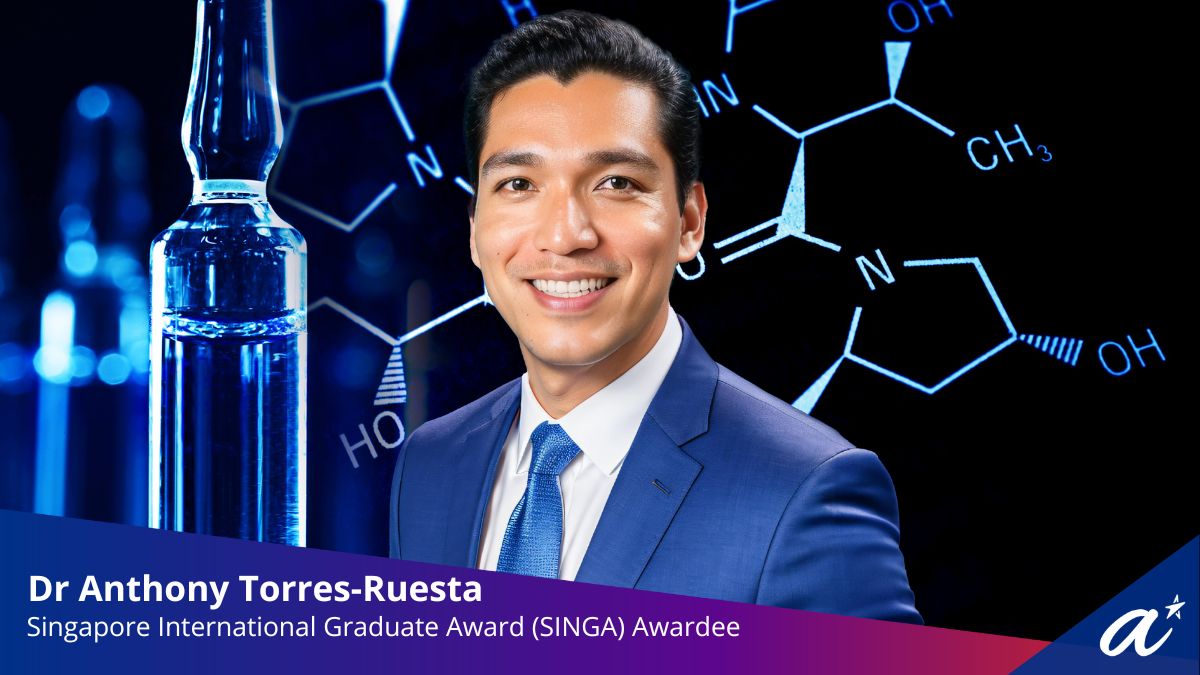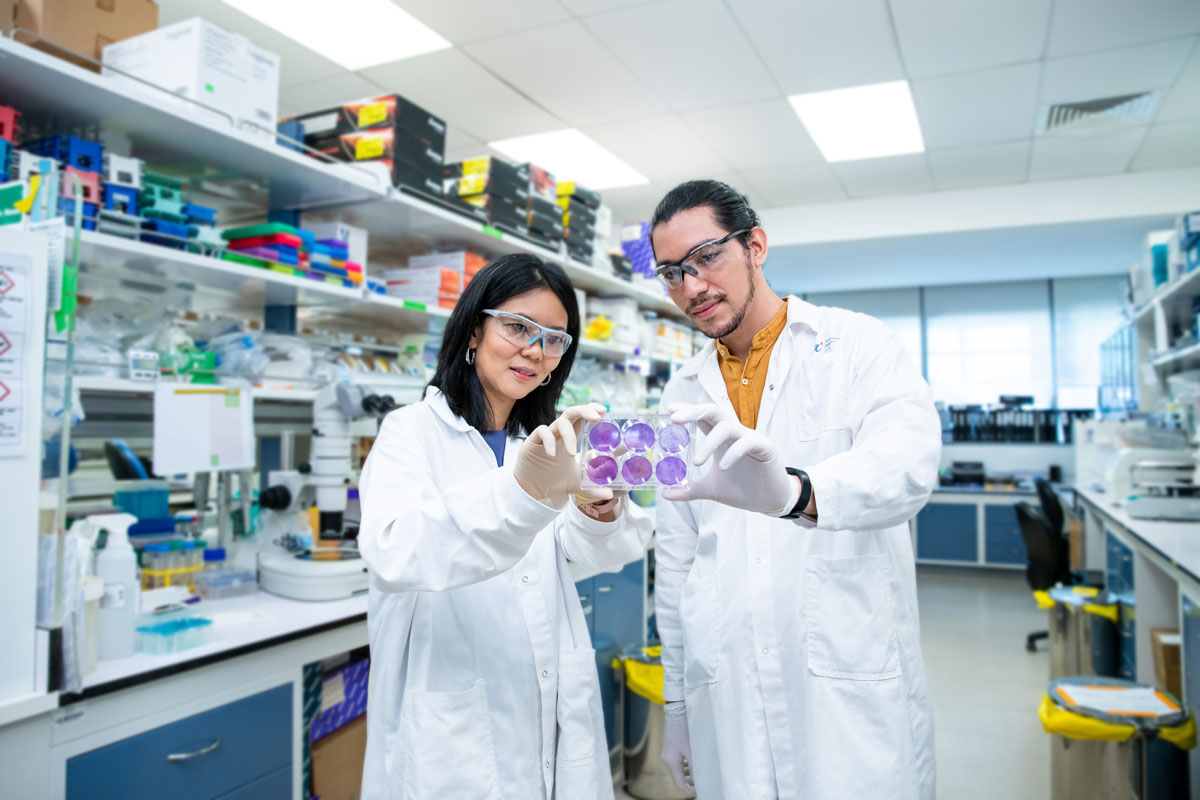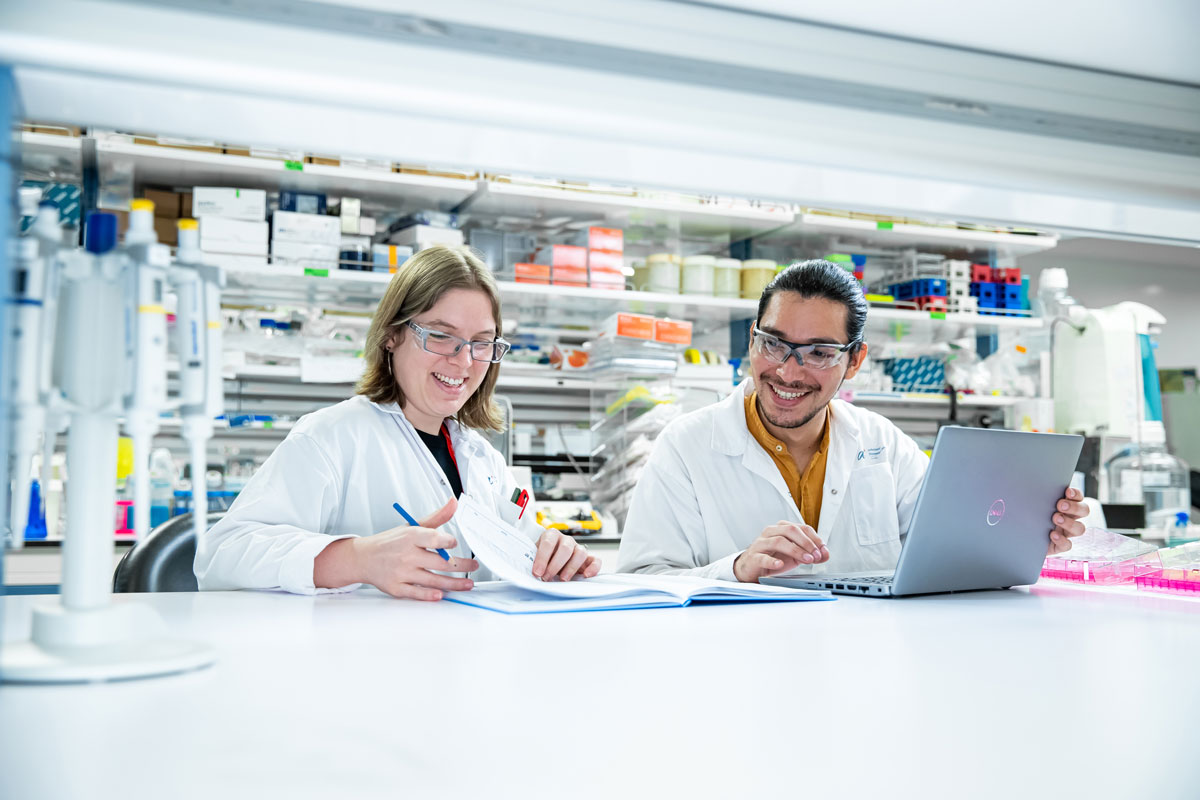SINGAPORE INTERNATIONAL GRADUATE AWARD (SINGA) awardee

Shaping a Healthier Future for Singapore and the World
A*STAR – Dr Anthony Torres-Ruesta
Scientist at A*STAR Infectious Diseases Labs
Originally from a small town in Peru, Dr Anthony Torres-Ruesta’s deep interest in biological sciences and good grades opened doors to the possibility of becoming an infectious diseases researcher, to understand the mechanisms leading to disease and to develop therapeutic alternatives.
After receiving a European Commission Erasmus Mundus scholarship to study one year in France, Anthony heard about the research work done in Singapore – “the little red dot”, where he eventually embarked on a new journey with A*STAR. A SIPGA and SINGA awardee, he envisions to be an opinion leader in the interphase of basic research and public health. Importantly, his work during the COVID-19 pandemic helped shape Singapore’s national policies on vaccination and booster requirements in different populations.
Q – What sparked your interest in Immunology and Tropical infectious diseases?
Infectious diseases were, and still are, prevalent in Northern Peru. I remember seeing my father deal with multiple episodes of malaria during the rainy seasons, when mosquito populations increased. But there was a particular event that hits close to home, and it is really a clear example of how research on infectious diseases can save lives. My mother was diagnosed with Toxoplasmosis, a parasitic disease caused by Toxoplasma gondii transmitted by the ingestion of undercooked meat. Due to this disease, she suffered several miscarriages and was unable to bear a child. Fortunately, my mother was treated with drugs that target the folate synthesis pathway, a mechanism needed for Toxoplasma proliferation and survival. This treatment cured her and granted her biggest wish: to become a mother.
Q – How did you discover A*STAR and what motivated you to choose Singapore?
After my time in France, I was actively looking for internship opportunities abroad, to gain more research exposure. Asia has always interested me due to its history and diversity. By constantly browsing for opportunities in Asia, particularly in tropical countries that deal with infectious diseases, I stumbled upon A*STAR’s SIPGA program. I contacted Prof. Lisa Ng, Executive Director and Senior Principal Investigator at A*STAR Infectious Diseases Labs, and she invited me to apply to that programme. I was selected and joined her lab for 4 months. During my training at her lab, I became fond of Singapore’s colors, flavors, and people. This experience convinced me of two things: (1) I was ready to embark on PhD training right after my bachelor’s degree, and (2) that the ideal place to do it was the Little Red Dot. After a competitive selection process, I returned to Singapore in 2018 as a SINGA doctoral student researching on alphavirus immunopathogenesis.
Q – You have been a SIPGA and SINGA awardee, can you share some key highlights, experiences, best moment, during your journey at NUS and A*STAR?
SIPGA offered me the chance to explore Singapore’s research ecosystem before committing for graduate training. It allowed me to get insights into the dynamics of my lab, the personality and work style of my supervisor, the people potentially working around me in the future and provided me the skillset needed to eventually drive my own PhD project. It also granted me the chance to explore Singapore as a place I could call home for the next few years. It was only after this series of events that I firmly decided to stay and apply to the SINGA programme.
Without a doubt, a critical moment of my PhD journey was to deal with the SARS-CoV-2 pandemic. I was fortunate enough to contribute as an essential worker during that trying time by studying the immune responses of COVID-19 patients, supporting Singapore’s national efforts against a then unknown virus.
Q – How did the scholarship enhance your academic experience while you were studying?
Particularly for me, as a first-generation scientist from a low-income family in Peru, merit-based scholarships have been the only way I could attend higher education abroad.
SIPGA is currently one of the very few programs worldwide that funds internships for international students and supported my stay in Singapore during my training at Prof. Lisa Ng’s lab.

Q – How have you been able to apply what you have learnt to your current work?
Certainly, a PhD is not only an advanced graduate degree. Its main objective is to form independent thinkers able to address complex problems in a systematic and creative way. My experience through SIPGA and SINGA, complemented by the mentoring from Prof. Lisa Ng and the support of my lab members have certainly contributed to my development as a mature researcher. The skills I gained during those years are constantly tested on a day-to-day basis and allow me to drive my own research independently.

Q – How would you describe the work culture at A*STAR?
A*STAR offers a unique opportunity within Singapore’s research ecosystem. We do not work as regular labs in universities and most of our projects involve "use-inspired basic research". The fact that think-tanks such as Biopolis and Fusionopolis comprise several labs with different expertise in proximity fosters the spirit of collaboration.Q – What possibilities are there for international students who would like to consider a PhD at A*STAR?
The possibilities are countless for those who are ready to be challenged. Personally, for international students who have not been to Asia or Singapore before, I would recommend exploring this environment through the SIPGA program. It will help students decide if Singapore is their place to be. A*STAR’s SINGA is a great option, it grants students the possibility to join some of the world’s top universities such as NUS or NTU for fully paid doctoral training while being based at A*STAR Research Institutes. Research here is competitive due to the state-of-the-art platforms we have to our avail and the spirit of collaboration between scientists of different fields.Q – How is life after working hours? Do you have any hobbies that you pursue to create a work life balance?
I try to set firm boundaries to avoid being burned out. My greatest hobby is traveling, I use any excuse for a weekend escapade anywhere in Asia to discover new flavors and meet new people. Japan is in my bucket list next year.
A*STAR celebrates International Women's Day

From groundbreaking discoveries to cutting-edge research, our researchers are empowering the next generation of female science, technology, engineering and mathematics (STEM) leaders.
Get inspired by our #WomeninSTEM

